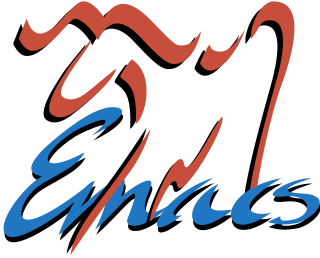Berkeley DB (BDB) is a software library intended to provide a high-performance embedded database for key/value data. Berkeley DB is written in C with API bindings for C++, C#, Java, Perl, PHP, Python, Ruby, Smalltalk, Tcl, and many other programming languages. BDB stores arbitrary key/data pairs as byte arrays, and supports multiple data items for a single key. Berkeley DB is not a relational database, although it has advanced database features including database transactions, multiversion concurrency control and write-ahead logging.

Cygwin is a POSIX-compatible programming and runtime environment that runs natively on Microsoft Windows. Under Cygwin, source code designed for Unix-like operating systems may be compiled with minimal modification and executed.

The GNU Compiler Collection (GCC) is an optimizing compiler produced by the GNU Project supporting various programming languages, hardware architectures and operating systems. The Free Software Foundation (FSF) distributes GCC as free software under the GNU General Public License. GCC is a key component of the GNU toolchain and the standard compiler for most projects related to GNU and the Linux kernel. With roughly 15 million lines of code in 2019, GCC is one of the biggest free programs in existence. It has played an important role in the growth of free software, as both a tool and an example.

GnuCash is an accounting program that implements a double-entry bookkeeping system. It was initially aimed at developing capabilities similar to Intuit, Inc.'s Quicken application, but also has features for small business accounting. Recent development has been focused on adapting to modern desktop support-library requirements.

XEmacs is a graphical- and console-based text editor which runs on almost any Unix-like operating system as well as Microsoft Windows. XEmacs is a fork, based on a version of GNU Emacs from the late 1980s. Any user can download, use, and modify XEmacs as free software available under the GNU General Public License version 2 or any later version.

GNU Octave is software featuring a high-level programming language, primarily intended for numerical computations. Octave helps in solving linear and nonlinear problems numerically, and for performing other numerical experiments using a language that is mostly compatible with MATLAB. It may also be used as a batch-oriented language. As part of the GNU Project, it is free software under the terms of the GNU General Public License.

Liberty BASIC (LB) is a commercial computer programming language and integrated development environment (IDE). It has an interpreter, developed in Smalltalk, which recognizes its own dialect of the BASIC programming language. It runs on 16- and 32-bit Windows and OS/2.
In computing, tar is a computer software utility for collecting many files into one archive file, often referred to as a tarball, for distribution or backup purposes. The name is derived from "tape archive", as it was originally developed to write data to sequential I/O devices with no file system of their own. The archive data sets created by tar contain various file system parameters, such as name, timestamps, ownership, file-access permissions, and directory organization.

GNU GRUB is a boot loader package from the GNU Project. GRUB is the reference implementation of the Free Software Foundation's Multiboot Specification, which provides a user the choice to boot one of multiple operating systems installed on a computer or select a specific kernel configuration available on a particular operating system's partitions.

The GNU C Library, commonly known as glibc, is the GNU Project's implementation of the C standard library. Despite its name, it now also directly supports C++. It was started in the 1980s by the Free Software Foundation (FSF) for the GNU operating system.
MinGW, formerly mingw32, is a free and open source software development environment to create Microsoft Windows applications. The development of the MinGW project has been forked with the creation in 2005–2008 of an alternative project called Mingw-w64.
dd is a command-line utility for Unix and Unix-like operating systems, the primary purpose of which is to convert and copy files.

GNU Ubiquitous Intelligent Language for Extensions is the preferred extension language system for the GNU Project and features an implementation of the programming language Scheme. Its first version was released in 1993. In addition to large parts of Scheme standards, Guile Scheme includes modularized extensions for many different programming tasks.
GNUmed is a Free/Libre electronic medical record (EMR) for Unix-like systems, Microsoft Windows, macOS and other platforms. GNUmed aims to provide medical software that respects the privacy of patients and that is based on open standards.

Linux is a family of open-source Unix-like operating systems based on the Linux kernel, an operating system kernel first released on September 17, 1991, by Linus Torvalds. Linux is typically packaged in a Linux distribution.

GNU Emacs is a free software text editor. It was created by GNU Project founder Richard Stallman. In common with other varieties of Emacs, GNU Emacs is extensible using a Turing complete programming language. GNU Emacs has been called "the most powerful text editor available today". With proper support from the underlying system, GNU Emacs is able to display files in multiple character sets, and has been able to simultaneously display most human languages since at least 1999. Throughout its history, GNU Emacs has been a central component of the GNU project, and a flagship of the free software movement. GNU Emacs is sometimes abbreviated as GNUMACS, especially to differentiate it from other EMACS variants. The tag line for GNU Emacs is "the extensible self-documenting text editor".

Emacs or EMACS is a family of text editors that are characterized by their extensibility. The manual for the most widely used variant, GNU Emacs, describes it as "the extensible, customizable, self-documenting, real-time display editor". Development of the first Emacs began in the mid-1970s, and work on its direct descendant, GNU Emacs, continues actively as of 2021.
Bionic is an implementation of the standard C library, developed by Google for its Android operating system. It differs from the GNU C Library (glibc) in being designed for devices with less memory and processor power than a typical Linux system. It is based on code from OpenBSD released under a BSD license, rather than glibc, which uses the GNU Lesser General Public License. This difference was important in the early days of Android, when static linking was common, and is still helpful in introducing Android to software companies used to proprietary operating systems, who can be wary of the LGPL, and unclear about the differences between it and the full GNU General Public License (GPL).

GNU Health is a free/libre health and hospital information system with strong focus on public health and social medicine. Its functionality includes management of electronic health records and laboratory information management system.
Objective-C is a general-purpose, object-oriented programming language that adds Smalltalk-style messaging to the C programming language. Originally developed by Brad Cox and Tom Love in the early 1980s, it was selected by NeXT for its NeXTSTEP operating system. Objective-C was the standard programming language supported by Apple for developing macOS and iOS applications using their respective application programming interfaces (APIs), Cocoa and Cocoa Touch, until the introduction of Swift in 2014.












